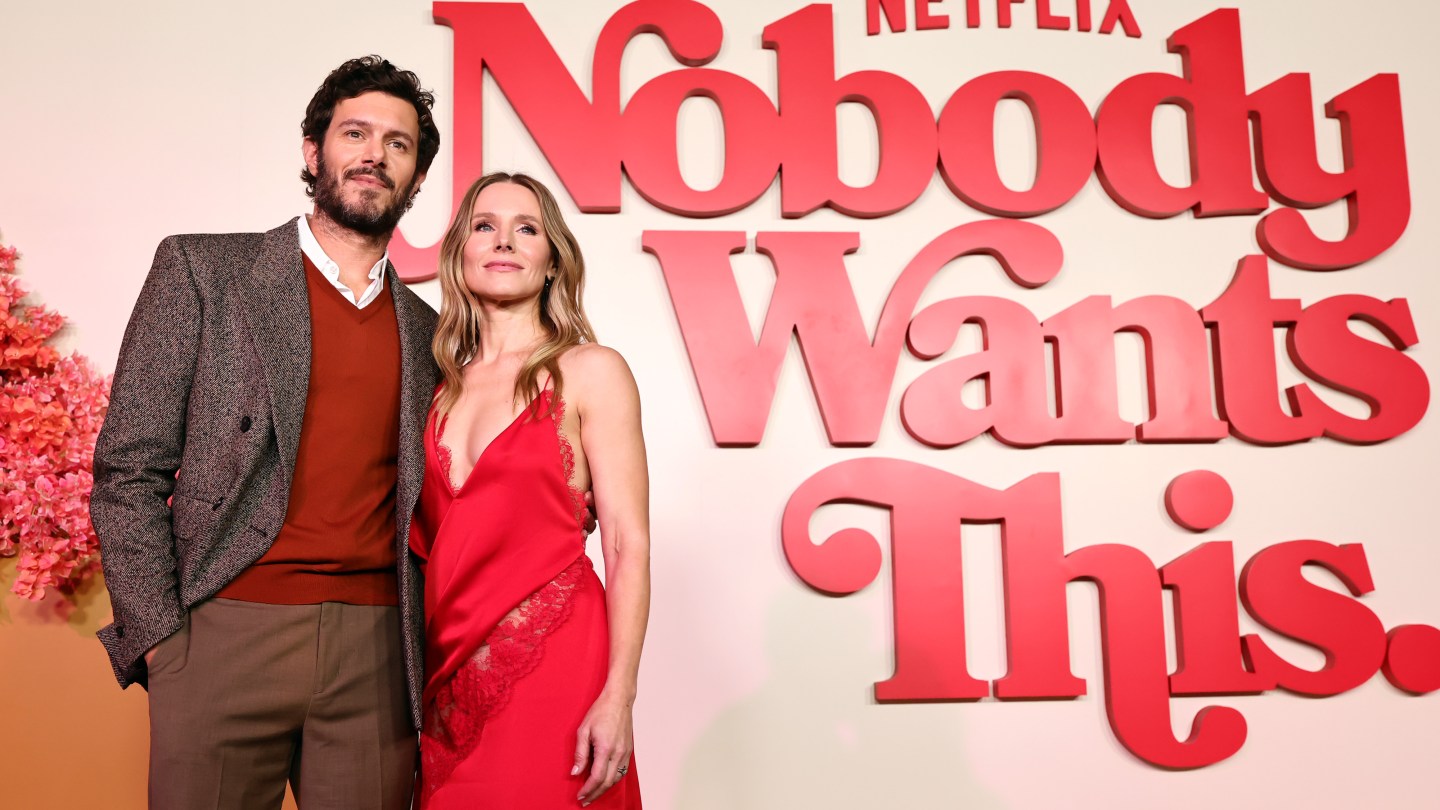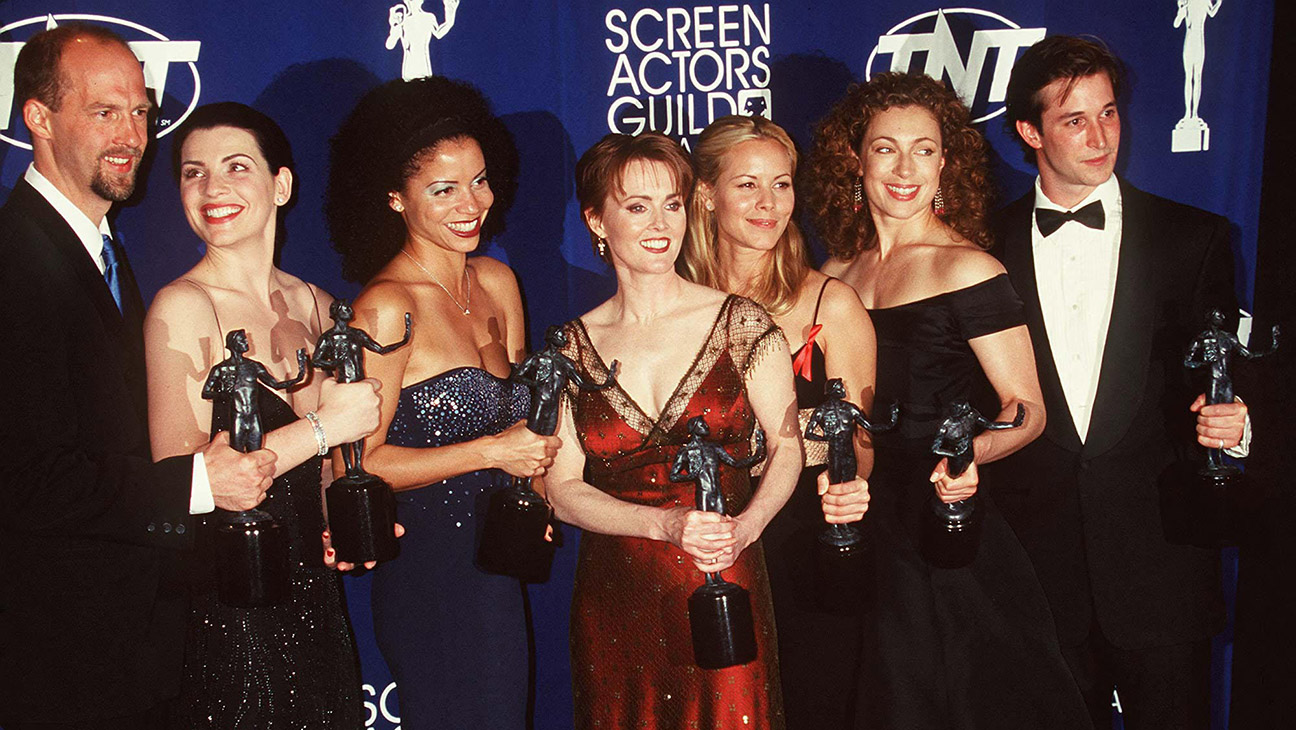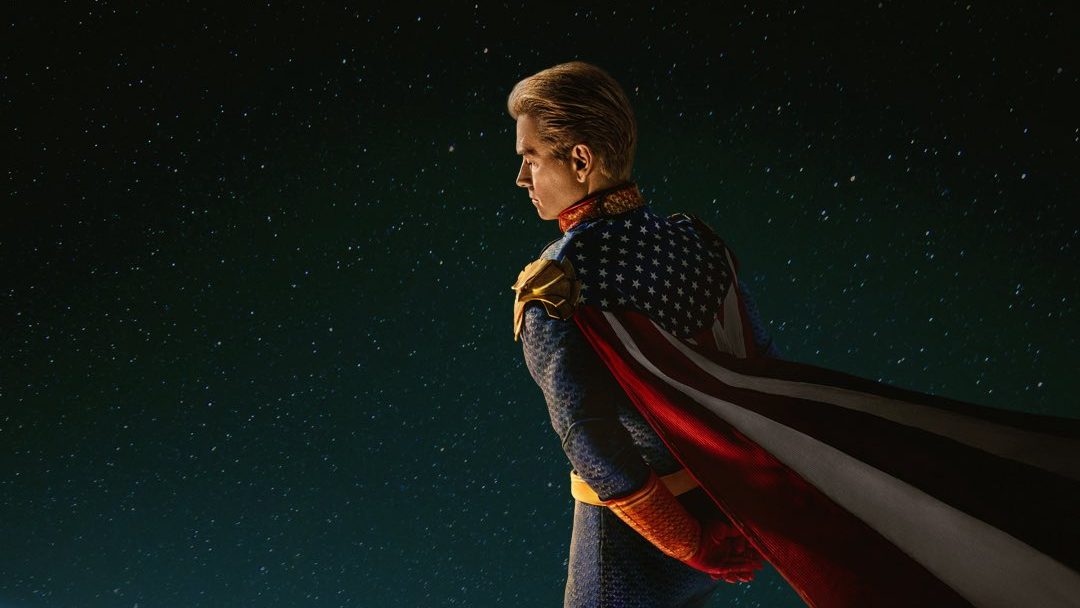About 20 years ago, when Six Feet Under ruled the prestige-TV roost, a casual moment unfolded in which the secular Jewish Brenda talked with her mother about her late father’s relationships. The father and his brother did not get along, the mother explained, because one could not forgive the other for “giving up Chanukah.”
Even my younger, less-formed self thought that line was funny, because, while Chanukah is a lovely holiday, it is not so central that its neglect could be a euphemism for assimilation. In fact, Chanukah is the one holiday that even many highly assimilated Jews celebrate.
This was a small moment in a much bigger show that had nothing to do with Judaism. So I just laughed it off; it was far from the first or last time a TV show bungled a nuance of the Jewish (or any other) tradition. Points for trying; let’s move on.
That would normally have been my response to a moment early in the recently released second season of Erin Foster’s Nobody Wants This, when Seth Rogen, as some corners of the Internet made mockingly clear, mistook Tu B’Shvat for Tisha B’av — when he called the saddest day of the Jewish year by the name of the birthday of trees. Rogen’s rabbi is proudly unconcerned with the details, so it could have been a comic mistake from the character as he was talking to Adam Brody’s more idealistic clergyman, lead character Noah Roklov. But Roklov doesn’t correct him and the whole thing just seems like an unfortunate production blunder. (Netflix curiously could still just overdub the two words, but another matter.)
I might have again had the Brenda reaction — “points for trying, let’s move on.” But this was a smaller moment in a much bigger show that has everything to do with Judaism. And sadly that moment epitomizes so much of what I think Nobody Wants This troublingly gets wrong.
Much has been made about the caricatured depictions in the first season of the Netflix series about the relationship between Noah and the non-Jewish Joanne (Kristen Bell), with Noah’s sister-in-law Esther and mother Bina coming right out of an old-time ethnic joke book. Esther becomes more dimensional this season; Bina, ever the cartoon villain, does not. But that’s not the show’s biggest problem. The main issue with Nobody Wants This is that it does not seem especially interested in the very Judaism it purports to be about — and worse, seems too often to suggest that there’s not even much to be interested in.
Like many religions, Judaism can provide moral grounding, community bonding, daily meaning and, at its most elevated, an awareness of and engagement with the divine. You’d never know it from watching Nobody Wants This, where it mainly seems like a way for family members to be suspicious of each other (Bina especially, vis-à-vis Joanne).
Two of the more promising moments — the kind that made me sit up and think we were actually going to get a full-blooded exploration of tradition — both fizzled into deracinated nothingness. An on-screen Purim party, which, despite 2,500 years of tradition that varies greatly by region, contains barely a single moment that has anything to do with the holiday, just becoming a Halloween party like so many others happening this weekend. And a “brit bat,” a daughter-naming tradition that has emerged as part of a gender-equity movement alongside the bris, teases you with talk about Ashkenazi naming traditions — but then its main takeaway becomes that Jews having babies live in very opulent houses and give ridiculously hippie names. (Seriously, who calls a baby “Afternoon”?)
Also, sorry, but in what world do Jews gather in a room in the last two years and not once mention, let alone debate, October 7, Gaza, Israel or hostages? In the real world unaffiliated Jews are discovering roots, asking questions, evolving beliefs, grappling with worldviews. My own synagogue has at least three new attendees currently doing just that. Yet in Nobody-world the main expression of Judaism for anyone who isn’t the rabbi is the donning of a “Matzah Baller” jersey. It’s not just cringe — it’s out of date.
Each episode of Nobody Wants This contains nothing offensive per se, by which I mean there’s no awful slur or (those Bina and Esther depictions aside) horribly crude stereotype. (Let’s not mention the first-season scene of Bina surreptitiously shoveling prosciutto in her mouth.) But the combined picture is nonetheless a dispiriting one, a vision of Jews who are celebrated only by how much they seem like everyone else — and not all by how much they’re like themselves. When you make a show about a rabbi for whom customs and commandments are supposedly very important, you would seem to have a bigger responsibility to show traditional Judaism for what it is. And Foster’s series, while often delightful and even moving, flubs the job.
Getting Tu’B’shvat and Tisha B’Av mixed up is not the biggest deal. Yet it still makes it hard to take a show about representation seriously. Could you imagine black-ish confusing Martin Luther King and Martin Luther? When you don’t seem to be that interested in what the icons mean, everything starts to feel like a gesture.
Foster seems excited by how fun she made one of the lead characters, and uses it as a defense against charges of stereotyping — “[Y]ou have a rabbi as the lead. A hot, cool, young rabbi who smokes weed,” she told the LA Times, defensively — seemingly unaware that the best argument for how dimensionally you portray a tradition is not by how much the people leading it are like anyone else. This is Judaism as hood ornament, elements dropped in to make you feel like something is being explored but in a show that has zero interest in actually doing the work. I know writers talked to a rabbi as a consultant, but it’s not clear from watching the show how much they asked about or listened to what they said.
The Noah character is an idealist, and the show does have moments when it actually seems to grasp something about affiliated Judaism; when he explains to Joanne how Jews like to ask questions from all sides, he really does catch a quality embedded deep within the tradition. But those moments are too few and far between, replaced instead by Judaism as something that mainly exists to stop you from being with your boyfriend. Even Noah’s idealism seems cut-and-pasted from another, more generic show. This may sound crazy but a few times this season Noah reminded me of E From Entourage, futilely trying to hold the line on idealism while everyone just tells him to get over it.
We’ve certainly come a long way from the Judaism in that show, which was mainly limited to Ari sneaking away to make calls on Yom Kippur. But when your biggest step forward evokes Vince and Johnny Drama, you may not have come as far as you think.
What kills me is that there are stakes and substance to the central relationship here; Nobody Wants This is more than just a guilty pleasure. Based partly on Foster’s own life, this is a show smart enough to insightfully engage with all kinds of issues — marriage, career, siblings, even real estate. Yet somehow it can’t spare any of that thoughtfulness for Judaism. As my colleague Daniel Fienberg recently wrote, Joanne and her sister in the first season possessed “a lack of knowledge or curiosity about Jewishness” to the point that it even “frequently resembled playful antisemitism.”
Taken on its own this would be uncomfortable enough, a supposed step forward for representation that actually sets it back — a Netflix hit that six years after Shtisel burned up the platform reverts us to a world in which many Jewish people have seemingly little allegiance to tradition and are accorded no depth to their faith. (Netflix was also the home of the hilariously caricaturish Unorthodox and My Unorthodox Life, so make of that what you will.)
But this isn’t about just one representational botching. Sociocultural shows never drop into a vacuum, and Nobody Wants This arrives in a world where Jewish identity has been completely transformed, even before October 7 but certainly after. Look no further than the reaction to Zohran Mamdani, the frontrunning mayoral candidate of the country’s biggest city and my own hometown, who has become a divisive figure in the Jewish community for his views on Israel. Mamdani has tried to calm the fires by talking about his planned police budget and hate-crime vigilance. But I can’t help feeling like he’s missing the point. Millions of Jewish New Yorkers identify with Israel, the place where nearly half of the world’s Jews now live, and have felt at home in New York precisely because of the bond between the places. The potential future leader of their city saying Israel shouldn’t be a Jewish state can’t but make them feel, at a very deep primordial level, they might not really be welcome in New York either.
What gnaws about Mamdani is the existential discomfort of not feeling at home in one’s home, which is the kind of thing that can’t be addressed by budget allocation. His mistake is, in many ways, the same as Foster’s — in thinking Jewish representation and solidarity is about box-checking, not about an attempt at genuine understanding.
I know, I know, Nobody Wants This is just meant to be “entertaining,” as a colleague of mine said when we were hashing this out. But somehow that doesn’t feel good enough. A show like blackish could have used that defense but never did, instead examining issues the Black community was going through with regular rigor while never sacrificing the comedy. You can choose not to do that in the first mainstream sitcom about a traditional Jewish person in decades, I suppose. But then you’re tokenizing and emptily trading on a faith and even missing an opportunity. This is the one chance many people will have to learn about Jewish tradition. And they come away knowing the thing they mainly knew before — it stops non-Jewish women and Jewish men from getting married.
Earlier this month the last of the alive Israeli hostages returned home from Gaza. The videos spreading across social media of Jews reuniting with their families, often with effusions of Jewish prayer — secular and religious, young and old, Ashkenazi and Sephardi — filled so many Jews (and plenty of non-Jews) with joy. For a brief moment our screens were awash with the kind of positive expressions of Jewish identity one too rarely sees on media platforms, giving a glimpse at the kind of respectfulness of purpose Nobody Wants This could have aimed for but too frequently chooses to avoid.
Late in this new season, when Sasha asks Noah while they’re playing ball if he would choose Judaism if he wasn’t born into it, the show seems tantalizingly, refreshingly, on the cusp of actually diving into questions that a show about representation purports to care about. But then Sasha hoists up a shot, makes a joke and the scene ends, no answers given. Instead, you’re left wondering about a different question, one I found myself mentally asking again and again watching this season: why would a TV show go out of its way to focus on a religion in which it has such evidently little interest?





